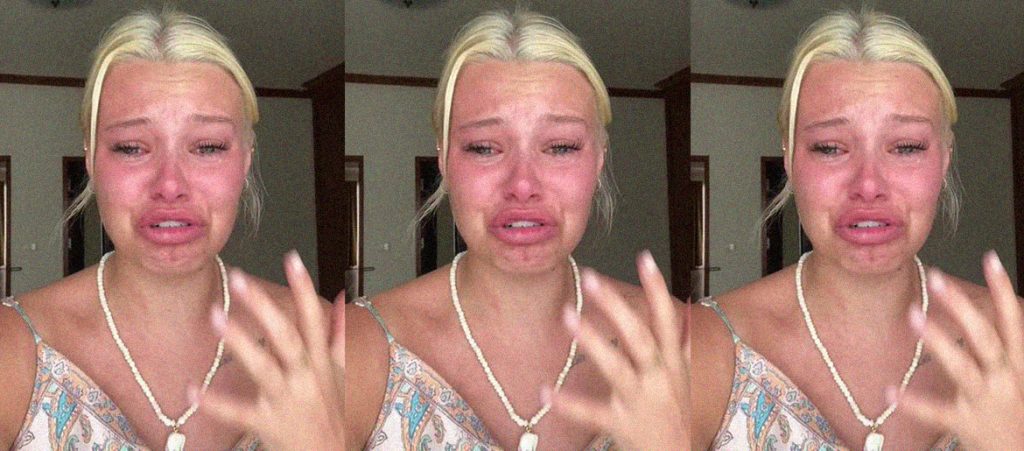
I have absolutely no doubt that Australian influencer Rory Eliza had only the best of intentions when she posted, in tears, about holding a monkey in Thailand. If you’re also chronically online, you know what I’m talking about. If not, here’s the gist: in the 21-year-old influencer’s recent video – posted to 6.8 million followers on TikTok and over 100,000 on both Instagram and YouTube – Rory is visibly distraught as she explains she “really, really wanted to hold a monkey”, but was horrified to see the animals in chains, being violently handled, showing signs of deprivation and distress at the tourist animal park she attended.
“We need to end this animal cruelty in other countries… Don’t support it guys, don’t pay money to see it. I wish I knew,” Rory says, bawling over the soundtrack of Tom Odell’s emotional ballad ‘Another Love’. “Stop animal cruelty.” It’s not a controversial statement, and many commenters (most appearing to be even younger than her) praised the influencer for raising important awareness about the barbaric practices of animal tourism.
But pretty soon, Rory’s video was receiving more critical comments and stitches on TikTok pointing out her naivety: how did she think wild animals would be trained to allow you to hold them, pet them, while taking a photo? As TikTok user @chikamso points out: “You just wanted the cuddle, you didn’t want to think about how it got there… No critical thinking, just vibes.”
@roryeliza Trigger warning. Dont support this. Its called the monkey show in Phuket. I wish i knew..: thats why they make u pay before u go in. Becaude they know its wrong
♬ original sound – 𝚁𝚘𝚛𝚢𝚎𝚕𝚒𝚣𝚊 ♛
The critics who stitched Rory’s video with their replies are right, of course. But you’d expect them to be – most of them are a lot older than her. And that’s the central tension popping up over and over again in discussion on TikTok and most online platforms now: grown adults were never supposed to be regularly listening in on teens and young adults voicing their still-developing worldviews. We aren’t supposed to be chit-chatting in the same spaces!
While the idea that our brains are underdeveloped until 25 is a bit of a pop science myth, the general findings of that field of research hold true. Brain structure, function and activity continue to develop throughout our 20s, particularly in the areas involved in risk-taking, emotional regulation and communication. You don’t have to be a neuroscientist to understand the average 29-year-old will think and articulate themselves differently to the average 19-year-old.
Being eager to share the new ideas, information and experiences you come across is just a normal part of being a young person. Discussion among peers is how we explore our own beliefs, test our knowledge, and literally figure out who we are. Sometimes those discussions will be a nuanced, critical contest of ideas… sometimes they will be very dumb. Both are fine! Learning requires you to get it wrong and wander down questionable mental paths. When it’s among friends, co-workers or relatives around the same age, the fight is fair because you’re all at similar stages of cognitive development.
Engaging in discourse and discussion with adults is definitely something teenagers and young adults should do (and vice versa), but it should probably be with people they know IRL or at least have a more established relationship with. Conversations about big ideas with my parents, teachers and professors, older relatives and colleagues absolutely shaped the way I think. They guided my ideas, challenged me and told me I was wrong – sometimes with tension and conflict, but always in good faith. What did our parents think when every Millennial teenager came from school that one day talking about Kony 2012?
Now a lot of these important discussions have shifted online into shared digital spaces. The thought of sharing the black-and-white, emphatic and very wrong opinions I held at 17 to millions of adults? Some of whom are experts in the very topic that I was exploring for the first time? Mortifying.
Even when a young person goes viral for voluntarily sharing a genuinely problematic idea, it still feels wrong for adult strangers to respond with heat. Ten years ago, you wouldn’t hear the appalling takes of teenage boys so frequently unless you knew them personally. Some might say it’s better for early misogyny and racism to be heard so that can be stamped out. The question is: heard by whom? Algorithms only amplify the most conflict-driven opinions, spreading them further and making the problems worse. Being put in their place online, losing opportunities or getting a bad reputation are natural consequences for choosing to post publicly – but if those ideas aren’t challenged by people in the kid’s daily life, who they respect, it’s unlikely to change much.
I’m not saying that young adults should be treated like babies, but there is a big difference between infantilisation and telling them “You’re stupid for not knowing this!”
i looked at this guy’s tiktok and he has 1600 followers and appears to be in high school. i cannot imagine what it would have been like if my terrible teen opinions got pushed to a wide audience by the algorithm https://t.co/XcF58lvqA7
— molly mary o’brien (@missmollymary) January 15, 2023
If there’s one benefit to teens and adults all being online together, it’s being able to observe different experiences and see critical thinking in action. Just before Rory’s monkey video went viral, TikTok’s main character was 29-year-old influencer Lexi Jay. Lexi shared what she thought was a wholesome story about Elena, the live-in Filipino nanny who worked for her parents, raising her and her siblings. Elena had finally retired after 30 years living with Lexi’s family… in which time, she had never been able to see her own children back home in the Philippines. Lexi had never considered the power disparity in this relationship until it was pointed out to her by many other creators and commenters.
At almost 30, she should have a better understanding of why Elena’s is not a ‘success story’ but a continuation of the unjust history of poor women doing labor for wealthy women. It’s fair game to point out the shortcomings in her worldview, empathy and thinking. Gen Z users are better off watching that discourse unfold, rather than being at the centre of it themselves.
I’m not immune to the burning impulse of correcting teenagers online. Scrolling through TikTok, Twitter, Instagram and Reddit, it’s natural to want to leave a comment that brings nuance, points out a fallacy, or introduces a perspective you think is missing. But I reckon we should stick to a Golden Rule for digital platforms: always check the account. If the person looks to be around your age or older, comment is free. If not, scroll on.
I’m not interested in beefing with a teenager, because I am normal.




Comments are closed.